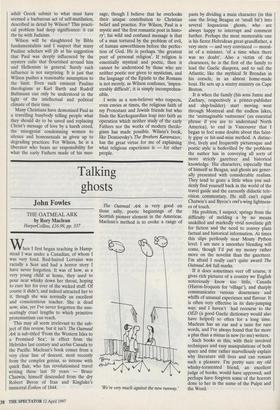Talking ghosts
John Fowles
THE OATMEAL ARK by Rory Maclean HarperCollins, £16.99, pp. 337
hen I first began teaching in Hamp- stead I was under a Canadian, of whom I was very fond. Red-haired Lorraine was racially a Scot and had a horror story I have never forgotten. It was of how, as a very young child at home, they used to pour neat whisky down her throat, hoping to cure her for ever of the wicked stuff. Of course it didn't, and indeed attracted her to it, though she was normally an excellent and conscientious teacher. She is dead now, alas, yet I've never forgotten the nau- seatingly cruel lengths to which primitive protestantism can reach.
This may all seem irrelevant to the sub- ject of this review, but it isn't. The Oatmeal Ark is sub-titled 'From the Western Isles to a Promised Sea'; in effect from the Hebrides last century and acr6ss Canada to the Pacific. Maclean's book comes from a very clear line of descent, most recently from the complex genius, so intense with quick flair, who has revolutionised travel writing these last 50 years — Bruce Chatwin, himself descended from the dry Robert Byron of Iran and Kinglake's immortal Eothen of 1844. The Oatmeal Ark is very good on those salty, poetic beginnings of the Scottish pioneer element in the Americas. Maclean's method is to evoke a range of `We're very much against the new runway.' pasts by dividing a main character (in this case the living Beagan or `small bit') into several loquacious ghosts, who are always happy to interrupt and comment further. Perhaps the most memorable one is his fierce Hebridean great-grandfather, a very stern — and very convinced — moral- ist of a minister, 'of a time when there was no doubt'. Also a victim of the clearances, he is the first of the family to lead the Gaelic diaspora, and to sail the Atlantic, like the mythical St Brendan in his coracle, in an almost home-made boat. He sets up a wintry ministry on Cape Breton.
It is when the family (his sons Jamie and Zachary, respectively a printer-publisher and ship-builder) start moving west through Montreal and the endless lakes, the 'unimaginable vastnesses' (an essential phrase if you are to understand North America), to end in Vancouver that I began to feel some doubts about this faint- ly gipsy or hit-and-miss method. A distinc- tive, lively and frequently picturesque and poetic style is bedevilled by the problems the author has in conveying all sorts of more strictly gazetteer and historical knowledge. His characters, especially that of himself as Beagan, and ghosts are gener- ally presented with considerable realism. They tend to grate a little when you sud- denly find yourself back in the world of the travel guide and the earnestly didactic tele- vision commentary. He still can't equal Chatwin's and Byron's owl's-wing lightness- es of touch.
His problem, I suspect, springs from the difficulty of melding a by no means unskilled and markedly vivid novelistic gift for fiction and the need to convey plain factual and historical information. At times this slips perilously near Monty Python level. I am sure a smoother blending will come, though I'd put my money rather more on the novelist than the gazetteer. I'm afraid I really can't quite award The Oatmeal Ark full marks.
If it does sometimes veer off course, it gives rich pictures of a country we English notoriously know too little, Canada (Huron-Iroquois for 'village), and sharply communicates various dournesses and whiffs of unusual experience and flavour. It is often very effective in its date-jumping way; and I haven't had recourse to the OED (a good Gaelic dictionary would also have helped) so often for a long time. Maclean has an ear and a taste for rare words, and I've always found that far more a plus than a minus in new (to me) writers.
Such books as this, with their involved techniques and easy manipulations of both space and time rather marvellously explain why literature still lives and can remain such a pleasure. I'm pretty sure my old whisky-tormented friend, an excellent judge of books, would have approved, and perhaps have forgiven some of the horrors done to her in the name of the Pulpit and the Word.


































































 Previous page
Previous page